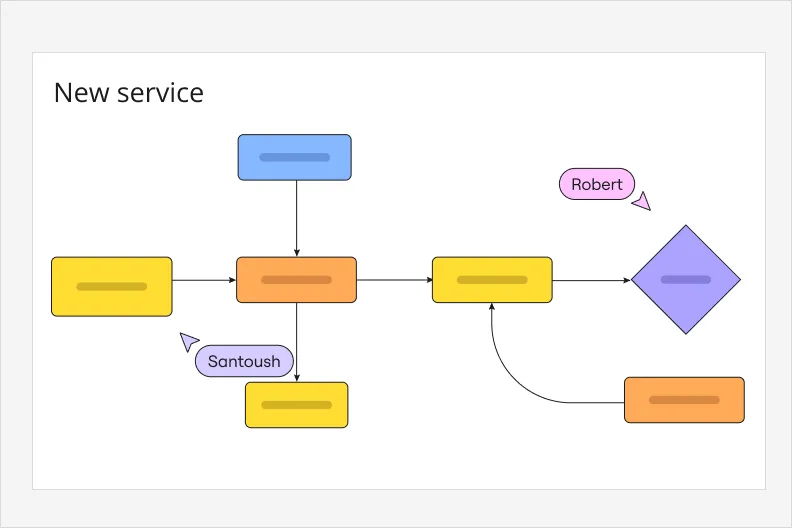Ett lättanvänt flödesschemaverktyg

Mallar för alla flödesscheman
Vårt omfattande mallbibliotek hjälper dig att skapa just det flödesschema som ditt projekt kräver. Börja arbeta i Miro med mallar, rita upp ert projekt tillsammans, förbättra tydligheten och leverera resultat snabbare. Oavsett vilket projekt du arbetar med har vi det du behöver.

Intuitiv flödesschemagenerator
Oavsett om du utarbetar ett arbetsflöde eller optimerar processer kan du använda Miro för att skapa ditt flödesschema. Gör informationen ännu mer lättillgänglig och visa kopplingar mellan olika element genom att lägga till former och ikoner från vårt bibliotek med ett fåtal klick.

Skapa gemensam förståelse
Spara tid när du skapar och kommunicerar flödesscheman och processer med hjälp av ett omfattande bibliotek med fria former, flödesschemamallar och kopplingar.

Varför Miro är den perfekta flödesschemageneratorn
Designa ditt flödesschema som ett proffs
Använd våra verktyg för att förenkla komplex information. Bläddra igenom vår ikoner, färgkoda beroenden och lägg till länkar och inbäddningar i ditt flödesschema. Integreringar, såsom Google Docs, låter dig redigera filer direkt i Miro och utan att duplicera arbetet.
Flödesschema för hybridteam
Miros visuella samarbetsplattform är det perfekta flödesschemaverktyget för utspridda och samlade team. Skapa snabbt idéer tillsammans med ditt team och kartlägg processer med vår flödesschemagenerator, oavsett var ni befinner er.
Vidta åtgärder och se till att alla arbetar mot samma mål
Se till att alla arbetar mot samma mål genom att arrangera kick-off-möten och skapa handlingsplaner, allt i ett gemensamt utrymme. När du är färdig med ditt flödesschema kan du lägga till handlingsbara objekt med projektstyrningsmallar och konvertera dem till ärenden på samma tavla. Miro integreras smidigt med verktyg som Jira och Asana.
Ett flödesschemaverktyg som är lätt att dela
Få feedback, gör ändringar och håll ordning på saker och ting med omfattande översikter av kommentarer och iterationer. Ge dina teammedlemmar åtkomst till dina flödesscheman, arbeta direkt med dem på tavlor eller exportera tavlor i form av bilder för användning i presentationer. Du kan även bädda in dina tavlor direkt i verktyg som Confluence och Microsoft Teams.
Relaterade mallar






Så här gör du ett flödesschema på ett par minuter


The world's most innovative companies are collaborating in Miro, everyday
”Med Miro gick vi från projektbriefing till marknadslansering på tio månader, en process som normalt tar tre år på PepsiCo.”
Caroline de Diego
Senior Manager, Global Design & Marketing Innovation på PepsiCo

”Genom att alla kan planera i Miro tillsammans händer de mest kraftfulla initiativen vid rätt tidpunkt.”
Lucy Starling
Product Operations Lead på Asos

”På tio minuter hade teamet introducerats i att använda Miro för seminarier. Att få vår organisation att använda denna produkt var ett självklart val.”
Konrad Grzegory
Agile Transformation Lead på CD PROJEKT RED

”Miros mallar hjälpte oss att gå från scratch till en komplett plan, där vi kartlade aktiviteter, idéer och beroenden.”
Marc Zukerman
Senior Director of Project Management på Hearst

"Miro låter alla våra team anpassa sig efter vissa verktyg och modeller: de arbetar självständigt och skapar produkter som verkligen uppfyller våra kunders behov."
Luke Pittar
Sustainability Innovation & Design Coach på The Warehouse Group

”För att vara verkligt innovativ måste alla ha en röst och alla måste kunna utveckla varandras idéer. Miro gjorde det möjligt för oss.”
Brian Chiccotelli
Learning Experience Designer på HP

Users love Miro for end-to-end innovation. We're the G2 leader in visual collaboration platforms and are rated in the top 50 enterprise tools. Miro helps large companies get meaningful work done.
Top 50 Products for Enterprise
G2 reviews


Vanliga frågor om flödesschemaverktyg
Hur använder jag ett flödesschema?
Oavsett vilken typ du väljer visar alla flödesscheman värdefull information om processer, metoder, steg-för-steg-guider och intressenter i ett projekt. Använd ett flödesschema för projektstyrning, enkelt samarbete och snabb informationsdelning.
Vilket är det bästa gratisprogrammet för att skapa ett flödesschema?
Miros flödesschemaverktyg är gratis och du kan använda det till att skapa just den typ av flödesschema du behöver. Vi gör det enkelt. Du behöver inte vara ett proffs för att skapa ditt eget flödesschema i Miro. Våra verktygsfunktioner är enkla att förstå och intuitiva. Kom igång genom att rita upp ett flödesschema med former och linjer och lägg sedan till färger och ikoner från vårt ikonbibliotek. Prova det gratis och berätta för oss om det passar för dig.




